(完整版)不定代词用法一览表
不定代词的用法

不定代词的用法不定代词是指在句中代替不明确或不确定的名词的一类代词。
它们在句子中充当名词的成分,起到代替和指代的作用。
不定代词可以用来表示数量、身份、归属、程度、时间等概念。
在英语中,不定代词有多种形式和用法,本文将对其常见的用法进行探讨。
一、不定代词的形式和用法1. some和anya. some用于肯定句中,表示某种或某些。
b. any用于否定句和疑问句中,表示任何的、任何一种或任何一些。
例句:- Could you give me some water, please?(请给我些水好吗?)- I don't have any money.(我没有一分钱。
)2. all和botha. all用于肯定句中,表示全部或所有的。
b. both用于肯定句中,表示两者都。
例句:- All students must attend the assembly.(所有学生都必须参加集会。
)- Both of them are my friends.(他们两个都是我的朋友。
)3. each和everya. each表示每一个(两者或两者以上的人或事物)。
b. every表示每一个(三个或三个以上的人或事物)。
例句:- Each student should bring their own books.(每位学生应该带自己的书。
)- Every child loves ice cream.(每个孩子都喜欢冰淇淋。
)4. someone和anyonea. someone用于肯定句中,表示某人或有人。
b. anyone用于否定句和疑问句中,表示任何人或任何一人。
例句:- I saw someone waiting for you at the station.(我看到有人在车站等你。
)- Have you seen anyone around here?(你在这附近见过任何人吗?)5. something和anythinga. something用于肯定句中,表示某物或有物。
不定代词的用法归纳
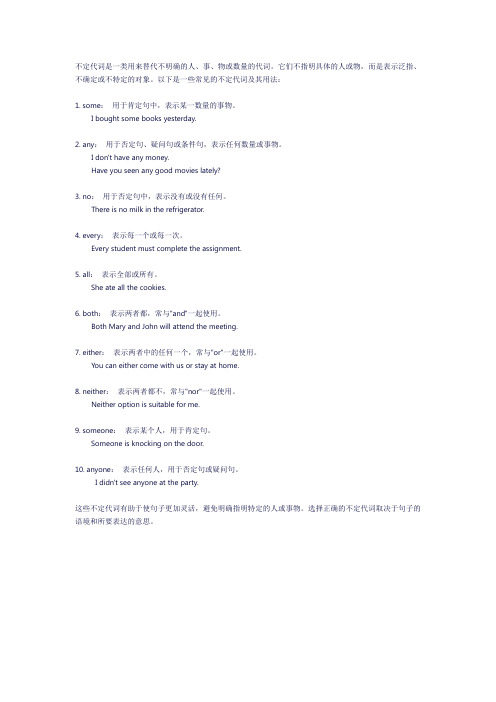
不定代词是一类用来替代不明确的人、事、物或数量的代词。
它们不指明具体的人或物,而是表示泛指、不确定或不特定的对象。
以下是一些常见的不定代词及其用法:1. some:用于肯定句中,表示某一数量的事物。
I bought some books yesterday.2. any:用于否定句、疑问句或条件句,表示任何数量或事物。
I don't have any money.Have you seen any good movies lately?3. no:用于否定句中,表示没有或没有任何。
There is no milk in the refrigerator.4. every:表示每一个或每一次。
Every student must complete the assignment.5. all:表示全部或所有。
She ate all the cookies.6. both:表示两者都,常与"and"一起使用。
Both Mary and John will attend the meeting.7. either:表示两者中的任何一个,常与"or"一起使用。
You can either come with us or stay at home.8. neither:表示两者都不,常与"nor"一起使用。
Neither option is suitable for me.9. someone:表示某个人,用于肯定句。
Someone is knocking on the door.10. anyone:表示任何人,用于否定句或疑问句。
I didn't see anyone at the party.这些不定代词有助于使句子更加灵活,避免明确指明特定的人或事物。
选择正确的不定代词取决于句子的语境和所要表达的意思。
(完整版)不定代词用法小结

一、不定代词概说英语的不定代词有 all, each, both, either, neither, one, none, little, few, many, much, other, another, some, any, no, (a) few, (a) little, both, enough, every 等,以及由 some, a ny, no 和 every 构成的合成代词(即somebody, anyone, nothing 等)。
在这些不定代词中,多数都能作主语、宾语、表语或定语,但是代词 none 以及由 some, any, no 和 every 构成的合成代词只能作主语、宾语或表语,不能作定语,而 no 和 every 则只用作定语。
二、指两者和三者的不定代词有些不定代词用于指两者(如both, either, neither),有的不定代词用于指三者(如all, any, n one, every),注意不要弄混:Both of my parents are doctors. 我的父母都是医生。
All of the students are interested in it。
所有的学生对此都很感兴趣.There are trees on any side of the square. 广场的每一边都种有树.He has two sons, neither of whom is rich. 他有两个儿子,都不富有。
He has three sons, none of whom is rich。
他有三个儿子,都不富有。
【说明】each 可用于两者、三者或三者以上,而 every 只用于三者或三者以上,因此用于两者时只能用 each,不能用 every.如不能说 There are trees on every side of the road.三、复合不定代词的用法特点复合不定代词包括 something, somebody, someone, anything, anybody, anyone, nothing, nobo dy, no one, everything, everybody, everyone 等。
(完整版)不定代词用法归纳
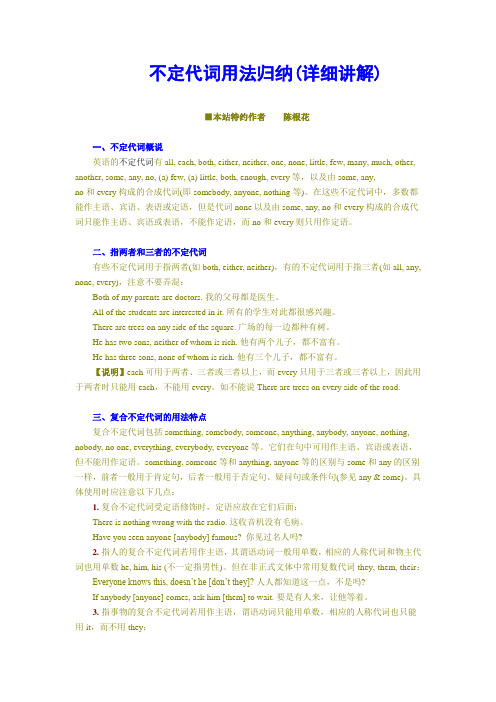
不定代词用法归纳(详细讲解)■本站特约作者陈根花一、不定代词概说英语的不定代词有 all, each, both, either, neither, one, none, little, few, many, much, other, another, some, any, no, (a) few, (a) little, both, enough, every 等,以及由 some, any,no 和 every 构成的合成代词(即somebody, anyone, nothing 等)。
在这些不定代词中,多数都能作主语、宾语、表语或定语,但是代词 none 以及由 some, any, no 和 every 构成的合成代词只能作主语、宾语或表语,不能作定语,而 no 和 every 则只用作定语。
二、指两者和三者的不定代词有些不定代词用于指两者(如both, either, neither),有的不定代词用于指三者(如all, any, none, every),注意不要弄混:Both of my parents are doctors. 我的父母都是医生。
All of the students are interested in it. 所有的学生对此都很感兴趣。
There are trees on any side of the square. 广场的每一边都种有树。
He has two sons, neither of whom is rich. 他有两个儿子,都不富有。
He has three sons, none of whom is rich. 他有三个儿子,都不富有。
【说明】each 可用于两者、三者或三者以上,而 every 只用于三者或三者以上,因此用于两者时只能用 each,不能用 every。
如不能说 There are trees on every side of the road.三、复合不定代词的用法特点复合不定代词包括 something, somebody, someone, anything, anybody, anyone, nothing, nobody, no one, everything, everybody, everyone 等。
不定代词的用法表解

不定代词的用法表解常用不定代词有:some( something,somebody,someone),any( anything,anybody,anyone),(no nothing,nobody,no(one),(every everything,everybody,everyone),all,each,both,much,many, a)little, a)few,other( s),another,none,one,either,(neither等。
一般来讲,修饰不定代词的词要置于其后。
由body,one,thing构成的合成代词:somebody,anybody,everybody,nobodysomeone,anyone,everyone,no(onesomething,anything,everything,nothing作代词的限定词:all,an,other,any,both,each,eitherfew,little,many,much,neither,noneother,some还有不能兼作代词的限定词(形容词)(主要是every,no)。
用法编辑不定代词大部分可以代替名词和形容词,在句中作主语、宾语、表语、定语和状语。
作主语Both(of(them(are(teachers.他们两人都是教师。
做主语时谓语动词用复数作宾语I(know(nothing(about(this(person.我对这个人一无所知。
作表语This(book(is(much(too(difficult(for(a(child.这本书对一个小孩来说太难了。
作定语There(is(a(little(water(in(the(glass.玻璃杯里有一些水。
可以在强调一下a(little,little,a(few,few的区别:a(little通常带有肯定的意思,表示还有一点;而little带有否定的意思,只剩一点儿了。
不定代词用法总结
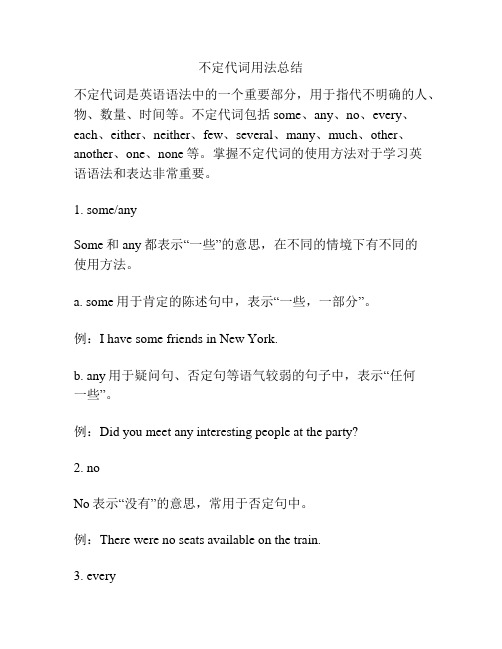
不定代词用法总结不定代词是英语语法中的一个重要部分,用于指代不明确的人、物、数量、时间等。
不定代词包括some、any、no、every、each、either、neither、few、several、many、much、other、another、one、none等。
掌握不定代词的使用方法对于学习英语语法和表达非常重要。
1. some/anySome和any都表示“一些”的意思,在不同的情境下有不同的使用方法。
a. some用于肯定的陈述句中,表示“一些,一部分”。
例:I have some friends in New York.b. any用于疑问句、否定句等语气较弱的句子中,表示“任何一些”。
例:Did you meet any interesting people at the party?2. noNo表示“没有”的意思,常用于否定句中。
例:There were no seats available on the train.3. everyEvery表示“每一个”的意思。
例:Every student is required to attend the meeting.4. eachEach表示“每一个”,用于强调个体。
例:Each student is responsible for his or her own progress.5. either/neitherEither表示“两者中的任何一个”,neither表示“两者都不”。
例:You can choose either the blue or the red dress.例:Neither of us likes to cook.6. few/several/many/much这些代词都用于表示数量或程度。
a. few表示“很少,几乎没有”。
例:There were few people in the park on such a hot day.b. several表示“几个,若干”。
(完整版)不定代词用法一览表
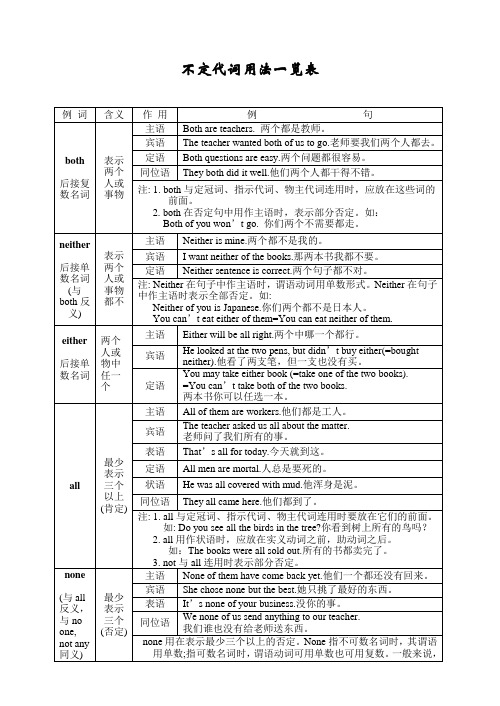
不定代词用法一览表不定代词不是指明代替任何特定名词的代词叫做不定代词。
常见的不定代词有all,both,each,every,some,any,many,much,(a)few,(a)little,one,ones,either,neither,other,another,no,none以及含有some-,any-,no-等的合成代词(如:anybody,something,no one)。
这些不定代词大都可以代替名词和形容词,在句中作主语、宾语、表语和定语。
但none和由some,any,no,every+thing,-body,-one构成的复合不定代同(如somebody等)只能作主语、宾语或表语;every和no只能作定语。
(这些词作定语时,有些语法书称之为形容词)下面我们把一些主要的不定代词用法归纳如下:one的用法1.one(一个),可以指人,也可以指物。
在句中可作主语、宾语和定语。
One should not praise oneself. 一个人不应炫耀自己。
(one作主语和宾语)If one wants to visit the city,one must find one’s own guide.如要参观这个城市,得自己找向导。
2.one,ones(one的复数形式)可用来代替前面出现过的少数名词,以避免重复。
Do you have a car?Yes,I have one. 你有一辆小汽车吗?是的,我有一辆。
I like small cars better than large ones. 我喜欢小汽车,不喜欢大汽车。
3.one的前面可用this,that,the,which等词修饰。
There are three pens,which one is yours,this one or that one or the one in the pencil-box?这儿有三支钢笔,哪一支是你的?这支?那支?还是在铅笔盒里的那支?4.a+形容词+one这一形式,经常见到或使用。
不定代词用法归纳总结知乎
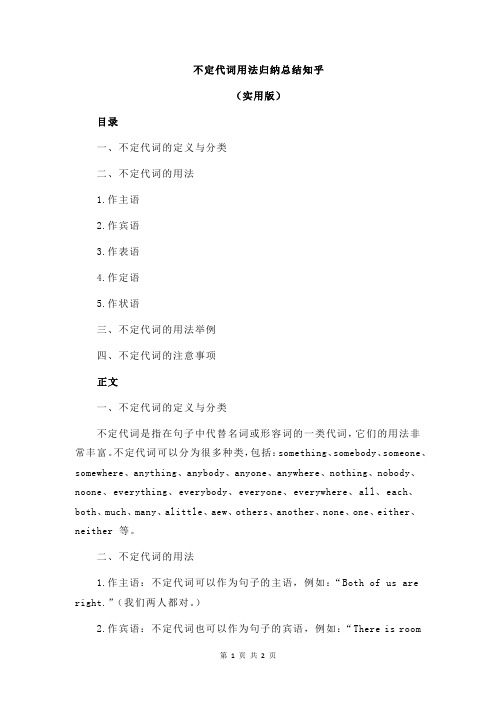
不定代词用法归纳总结知乎(实用版)目录一、不定代词的定义与分类二、不定代词的用法1.作主语2.作宾语3.作表语4.作定语5.作状语三、不定代词的用法举例四、不定代词的注意事项正文一、不定代词的定义与分类不定代词是指在句子中代替名词或形容词的一类代词,它们的用法非常丰富。
不定代词可以分为很多种类,包括:something、somebody、someone、somewhere、anything、anybody、anyone、anywhere、nothing、nobody、noone、everything、everybody、everyone、everywhere、all、each、both、much、many、alittle、aew、others、another、none、one、either、neither 等。
二、不定代词的用法1.作主语:不定代词可以作为句子的主语,例如:“Both of us are right.”(我们两人都对。
)2.作宾语:不定代词也可以作为句子的宾语,例如:“There is roomfor all of us.”(我们所有的人全坐得下。
)3.作表语:不定代词可以作为句子的表语,例如:“That"s nothing.”(没什么。
)4.作定语:不定代词可以作为句子的定语,例如:“You may take either road.”(两条路你走哪条都行。
)5.作状语:不定代词可以作为句子的状语,例如:“I can"t find my book anywhere.”(我在任何地方都不能找到我的书。
)三、不定代词的用法举例以下是一些不定代词在句子中的实际用法举例:- Both of them are teachers.(他们两人都是教师。
)- I know nothing about this person.(我对这个人一无所知。
)- This book is too much difficult for a child.(这本书对一个小孩来说太难了。
完整版)不定代词用法总结
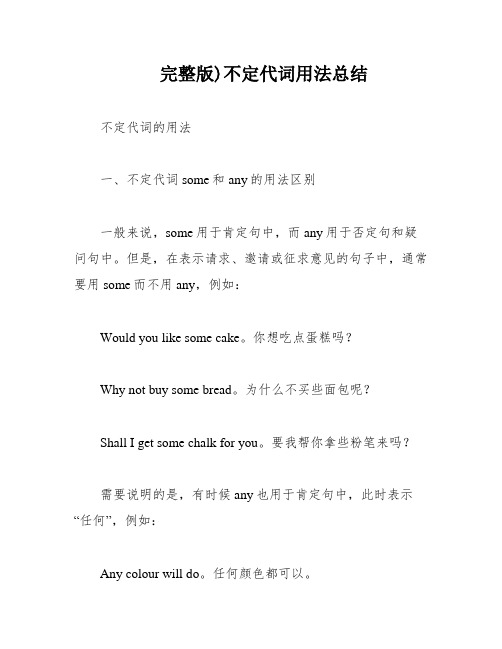
完整版)不定代词用法总结不定代词的用法一、不定代词some和any的用法区别一般来说,some用于肯定句中,而any用于否定句和疑问句中。
但是,在表示请求、邀请或征求意见的句子中,通常要用some而不用any,例如:Would you like some cake。
你想吃点蛋糕吗?Why not buy some bread。
为什么不买些面包呢?Shall I get some chalk for you。
要我帮你拿些粉笔来吗?需要说明的是,有时候any也用于肯定句中,此时表示“任何”,例如:Any colour will do。
任何颜色都可以。
Come any day you like。
你随便哪天来都可以。
二、不定代词many和much的用法以及区别不定代词many和much都表示“许多”,但many修饰或代替可数名词(复数),与few(少数)相对;而much用来修饰或代替不可数名词(单数),与little(少量)相对。
在口语中,两者主要用于非肯定句中,例如:Did you see many people there。
你在那儿看见许多人了吗?We don’t have much time。
我们没有许多时间。
XXX work has been done。
许多工作都已经做了。
You’ve given me too much。
你给我太多了。
Take as many (much) as you want。
你要多少拿多少。
I asked her a great many ns。
我问了她许多问题。
另外需要注意的是,too much可以作副词或代词,也可以用作形容词修饰不可数名词,例如:Is watching TV too much good or bad for your health。
看电视太多对你的健康有益还是有害?You’ve given me too much。
你给我的太多了。
We’ve had too much rain lately。
不定代词的用法大全

不定代词的⽤法⼤全不定代词的⽤法,在⼩学、初中和⾼中三个阶段的考试中,都会考查到,⽽不定代词的内容⼜较为繁杂,所以今天就跟⼤家来梳理⼀下。
⼀、定义不定代词是指⽤来指代特定名词或形容词的的代词,但这类代词所指代的⼈或物是不特定的。
如“some men”,⼀些⼈,短语中的不定代词some只是⽤来指代某些⼈,但没有明确指明是哪些⼈。
⼆、分类不定代词主要分为三类:合成不定代词;兼作代词的限定词;不能兼作代词的限定词。
(⼀)合成不定代词这类不定代词⼜叫复合不定代词,主要是由every、some、any和no分别与body、one和thing所构成的12个不定代词。
他们是:everybody, everyone, everything;somebody, someone, something;anybody, anyone, anything;nobody, no one, nothing。
其中,⽐较特别的是no one,需要注意跟none的区别,本⽂后⾯会说到两者的区别。
(⼆)兼作代词的限定词这类词之所以被称作兼作代词的限定词,是因为它们除了可以作代词外,还可以⽤作形容词、副词或名词等。
这类词主要有:all,any,both,each,either, neither,none, (a) few,(a)little,many,much,another, other, others, some。
(三)不能兼作代词的限定词这类词⼀般不能直接作为代词独⽴在句中充当句⼦成分,这类词主要有every和no。
三、句法功能1、作主语Everyone is at the party now.Both of them like the dress.【注意】every和no不能作主语。
2、作宾语I don't like anyone of them.If you have any, give us some.【注意】every和no不能作宾语。
不定代词的用法总结
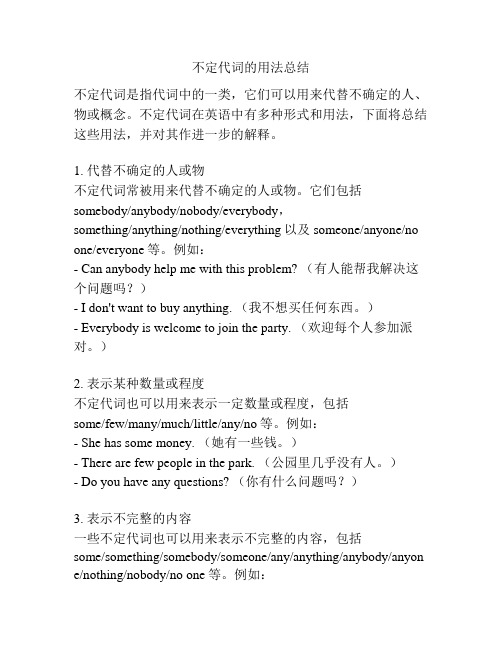
不定代词的用法总结不定代词是指代词中的一类,它们可以用来代替不确定的人、物或概念。
不定代词在英语中有多种形式和用法,下面将总结这些用法,并对其作进一步的解释。
1. 代替不确定的人或物不定代词常被用来代替不确定的人或物。
它们包括somebody/anybody/nobody/everybody,something/anything/nothing/everything以及someone/anyone/no one/everyone等。
例如:- Can anybody help me with this problem? (有人能帮我解决这个问题吗?)- I don't want to buy anything. (我不想买任何东西。
)- Everybody is welcome to join the party. (欢迎每个人参加派对。
)2. 表示某种数量或程度不定代词也可以用来表示一定数量或程度,包括some/few/many/much/little/any/no等。
例如:- She has some money. (她有一些钱。
)- There are few people in the park. (公园里几乎没有人。
)- Do you have any questions? (你有什么问题吗?)3. 表示不完整的内容一些不定代词也可以用来表示不完整的内容,包括some/something/somebody/someone/any/anything/anybody/anyon e/nothing/nobody/no one等。
例如:- I have something to tell you. (我有件事要告诉你。
)- Is there anyone who can help me? (有人可以帮帮我吗?)- She knows nothing about it. (她对此一无所知。
不定代词用法一览表
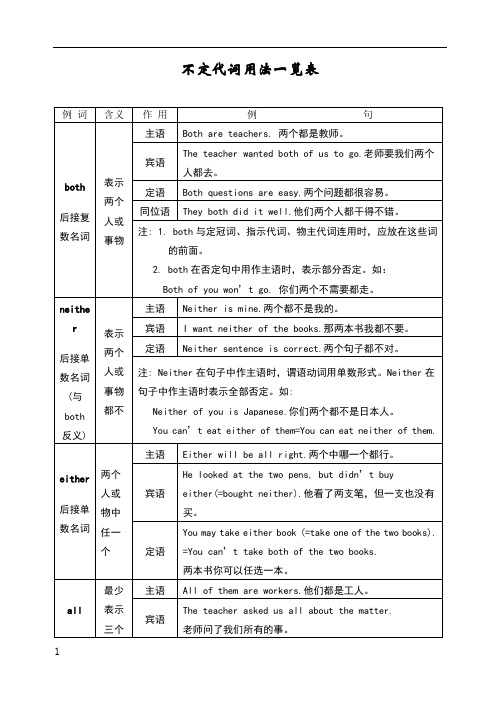
不定代词用法一览表不定代词不是指明代替任何特定名词的代词叫做不定代词。
常见的不定代词有all,both,each,every,some,any,many,much,(a)few,(a)little,one,ones,either,neither,other,another,no,none以及含有some-,any-,no-等的合成代词(如:anybody,something,no one)。
这些不定代词大都可以代替名词和形容词,在句中作主语、宾语、表语和定语。
但none和由some,any,no,every+thing,-body,-one构成的复合不定代同(如somebody等)只能作主语、宾语或表语;every和no只能作定语。
(这些词作定语时,有些语法书称之为形容词)下面我们把一些主要的不定代词用法归纳如下:one的用法(一个),可以指人,也可以指物。
在句中可作主语、宾语和定语。
One should not praise oneself. 一个人不应炫耀自己。
(one作主语和宾语)If one wants to visit the city,one mu st find one’s own guide.如要参观这个城市,得自己找向导。
,ones(one的复数形式)可用来代替前面出现过的少数名词,以避免重复。
Do you have a carYes,I have one. 你有一辆小汽车吗是的,我有一辆。
I like small cars better than large ones. 我喜欢小汽车,不喜欢大汽车。
的前面可用this,that,the,which等词修饰。
There are three pens,which one is yours,this one or that one or the one in the pencil-box这儿有三支钢笔,哪一支是你的这支那支还是在铅笔盒里的那支+形容词+one这一形式,经常见到或使用。
中考初中语法——不定代词用法一览表

中考初中语法——不定代词用法一览表例词含义作用例句both后接复数名词表示两个人或事物主语Both are teachers. 两个都是教师。
宾语The teacher wanted both of us to go.老师要我们两个人都去。
定语Both questions are easy.两个问题都很容易。
同位语They both did it well.他们两个人都干得不错。
注: 1. both与定冠词、指示代词、物主代词连用时,应放在这些词的前面。
2. both在否定句中用作主语时,表示部分否定。
如:Both of you won't go. 你们两个不需要都走。
neither后接单数名词(与both 反义) 表示两个人或事物都不主语Neither is mine.两个都不是我的。
宾语I want neither of the books.那两本书我都不要。
定语Neither sentence is correct.两个句子都不对。
注: Neither在句子中作主语时,谓语动词用单数形式。
Neither在句子中作主语时表示全部否定。
如:Neither of you is Japanese.你们两个都不是日本人。
You can't eat either of them=You can eat neither of them.either后接单数名词两个人或物中任一个主语Either will be all right.两个中哪一个都行。
宾语He looked at the two pens, but didn't buyeither(=bought neither).他看了两支笔,但一支也没有买。
定语You may take either book (=take one of the twobooks).=You can't take both of the two books. 两本书你可以任选一本。
完整版不定代词用法一览表

不定代词用法一览表的所属格为。
的所属格为。
不定代词不是指明代替任何特定名词的代词叫做不定代词。
常见的不定代词有all , both, each, every, some, any, many, much, ( a) few ,(a) little 、 one, ones, either, neither, other, another, no, none 以及含有some-, any-, no-等的合成代(如:anybody, something, no one)0些不定代大都可以代替名和形容,在句中作主、、表和定。
但none和由some, any, no, every+thing , -body, ・one构成的复合不定代同(如somebody等)只能作主、或表;every和no只能作定。
(些作定,有些法称之形容)下面我把一些主要的不定代用法如下:one的用法l.one (—个),可以指人,也可以指物。
在句中可作主、和定。
One should not praise oneself. 一个人不炫耀自己。
(one 作主和)If one wants to visit the city , one must find one ' s own guide.如要参个城市,得自己找向。
2.one, ones (one的复数形式)可用来代替前面出的少数名,以避免重复。
Do you have a car? Yes, I have one.你有一小汽?是的,我有一。
I like small cars better than large ones. 我喜小汽,不喜大汽。
3.one 的前面可用this , that, the, which 等修。
There are three pens, which one is yours , this one or that one or the one in the pencil-box ? 儿有三支笔,哪一支是你的?支?那支?是在笔盒里的那支?4.a+形容+one 一形式,常到或使用。
不定代词用法一览表

不定代词用法一览表相反)some表示主语All the students are here.所有学生都在这里。
表示宾语I have none of the books.我一个书都没有。
表示定语None of the students are absent.没有一个学生缺席。
表示主语Some of the students are absent.有一些学生缺席。
注: 1.none在句子中作主语时,谓语动词用单数形式。
2.some在肯定句中表示“一些”,在疑问句中表示“大约”,在否定句中表示“一点也不”。
如:Some of the students are absent.有一些学生缺席。
Do you have some money?你有一些钱吗?___.他懂一点英语。
I have no money。
He has none。
either.我没钱,他也没钱。
表示主语All of us are here.我们都在这里。
表示宾语I gave all of the apples to him.我把所有的苹果都给了他。
表示表语All is well.一切都好。
注: 1.all在肯定句中表示“全部”,在否定句中表示“没有一个”。
2.在all后面加上the时,表示“所有的人或物中的唯一一个”。
如:All the people in the room were surprised.房间里的所有人都很惊讶。
___ ___.他吃了整个蛋糕。
All the money in the ___里所有的钱都被偷了。
He is all the family I have.他是我唯一的家人。
All men are mortal。
meaning that every human being will eventually die。
He was all covered with mud。
from head to toe。
They all came here。
不定代词用法一览表

不定代词用法一览表 Company Document number:WTUT-WT88Y-W8BBGB-不定代词用法一览表不定代词不是指明代替任何特定名词的代词叫做不定代词。
常见的不定代词有all,both,each,every,some,any,many,much,(a)few,(a)little,one,ones,either,neither,other,another,no,none以及含有some-,any-,no-等的合成代词(如:anybody,something,no one)。
这些不定代词大都可以代替名词和形容词,在句中作主语、宾语、表语和定语。
但none和由some,any,no,every+thing,-body,-one构成的复合不定代同(如somebody等)只能作主语、宾语或表语;every和no只能作定语。
(这些词作定语时,有些语法书称之为形容词)下面我们把一些主要的不定代词用法归纳如下:one的用法(一个),可以指人,也可以指物。
在句中可作主语、宾语和定语。
One should not praise oneself. 一个人不应炫耀自己。
(one作主语和宾语)If one wants to visit the city,one must find one’s own guide.如要参观这个城市,得自己找向导。
,ones(one的复数形式)可用来代替前面出现过的少数名词,以避免重复。
Do you have a carYes,I have one. 你有一辆小汽车吗是的,我有一辆。
I like small cars better than large ones. 我喜欢小汽车,不喜欢大汽车。
的前面可用this,that,the,which等词修饰。
There are three pens,which one is yours,this one or that one or the one in the pencil-box 这儿有三支钢笔,哪一支是你的这支那支还是在铅笔盒里的那支+形容词+one这一形式,经常见到或使用。
不定代词的用法总

There is someone in your office. Can you hear them talking? 你办公室里有人。你听见他们说话了吗? them指代someone No one was kinder to me at that time than Rose. 那时,没有一个人比Rose对我更好。 4. 第二部分为 第二部分为-thing的复合代词只能用于指物。如: 的复合代词只能用于指物。 的复合代词只能用于指物 There was something wrong with the car so he had to stopped it. Why don’t you say something to me? He looked at me and didn’t say anything. Nothing can be done to save her life.
由于each和every的意思相近,都表示“每 和 的意思相近, 由于 的意思相近 都表示“ 一个” 因此要特别注意它们的区别。 一个”,因此要特别注意它们的区别。each 所描述的对象至少是两个数目中的每一个, 所描述的对象至少是两个数目中的每一个, 而every所描述的对象至少是三个数目中的每 所描述的对象至少是三个数目中的每 一个; 着重强调整体的含义而each着 一个;every着重强调整体的含义而 着重强调整体的含义而 着 重强调个别; 重强调个别;every只能作形容词放于名词前 只能作形容词放于名词前 可以作形容词、 而each可以作形容词、代词和副词。如: 可以作形容词 代词和副词。 Every/Each man knows what he has to do . Every /Each man knows his job.
(完整)初中英语常考易混不定代词的用法
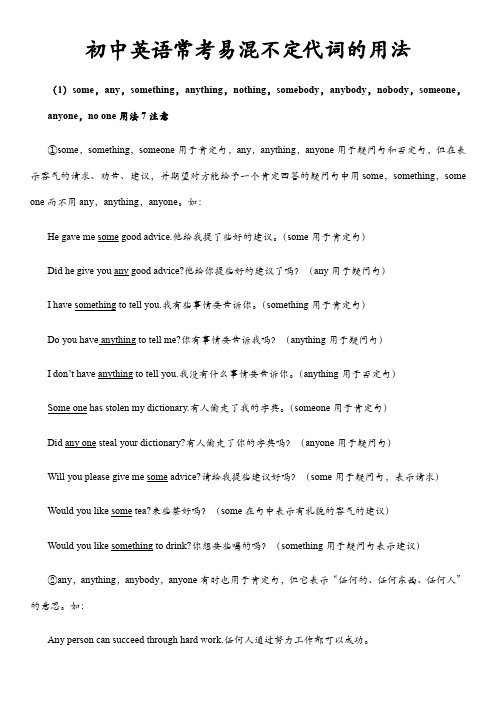
初中英语常考易混不定代词的用法(1)some,any,something,anything,nothing,somebody,anybody,nobody,someone,anyone,no one用法7注意①some,something,someone用于肯定句,any,anything,anyone用于疑问句和否定句,但在表示客气的请求、劝告、建议,并期望对方能给予一个肯定回答的疑问句中用some,something,some one而不用any,anything,anyone。
如:He gave me some good advice.他给我提了些好的建议。
(some用于肯定句)Did he give you any good advice?他给你提些好的建议了吗?(any用于疑问句)I have something to tell you.我有些事情要告诉你。
(something用于肯定句)Do you have anything to tell me?你有事情要告诉我吗?(anything用于疑问句)I don’t have anything to tell you.我没有什么事情要告诉你。
(anything用于否定句)Some one has stolen my dictionary.有人偷走了我的字典。
(someone用于肯定句)Did any one steal your dictionary?有人偷走了你的字典吗?(anyone用于疑问句)Will you please give me some advice?请给我提些建议好吗?(some用于疑问句,表示请求)Would you like some tea?来些茶好吗?(some在句中表示有礼貌的客气的建议)Would you like something to drink?你想要些喝的吗?(something用于疑问句表示建议)②any,anything,anybody,anyone有时也用于肯定句,但它表示“任何的、任何东西、任何人”的意思。
不定代词的用法

We've received two parcels, one from my uncle, the other from my aunt. I don't like this one, show me another, please.
后面不能加名词
In the park some are playing games. Others are walking near the river. I have five color pencils. One is red, another is blue and the others are green.
4. 1) some 和 any
(1) A. some (一些,某个)句中可作主语、宾语、定语等,
常用于肯定句。作定语时,可修饰可数和不可数名词, 可数名词是单数时,some 表示 “某个” 的意思。
There are some newspapers on the table. I am going to buy some orange juice. Have you any questions? Yes, I have some.
(3) They will all / both / each go there. They will all / both / each be invited to the birthday party.
6) either可作副词用于否定句: “也”, 相当于肯定句中的 too
这不是我的, 那也不是。
- 1、下载文档前请自行甄别文档内容的完整性,平台不提供额外的编辑、内容补充、找答案等附加服务。
- 2、"仅部分预览"的文档,不可在线预览部分如存在完整性等问题,可反馈申请退款(可完整预览的文档不适用该条件!)。
- 3、如文档侵犯您的权益,请联系客服反馈,我们会尽快为您处理(人工客服工作时间:9:00-18:30)。
不定代词用法一览表不定代词不是指明代替任何特定名词的代词叫做不定代词。
常见的不定代词有all,both,each,every,some,any,many,much,(a)few,(a)little,one,ones,either,neither,other,another,no,none以及含有some-,any-,no-等的合成代词(如:anybody,something,no one)。
这些不定代词大都可以代替名词和形容词,在句中作主语、宾语、表语和定语。
但none和由some,any,no,every+thing,-body,-one构成的复合不定代同(如somebody等)只能作主语、宾语或表语;every和no只能作定语。
(这些词作定语时,有些语法书称之为形容词)下面我们把一些主要的不定代词用法归纳如下:one的用法1.one(一个),可以指人,也可以指物。
在句中可作主语、宾语和定语。
One should not praise oneself. 一个人不应炫耀自己。
(one作主语和宾语)If one wants to visit the city,one must find one’s own guide.如要参观这个城市,得自己找向导。
2.one,ones(one的复数形式)可用来代替前面出现过的少数名词,以避免重复。
Do you have a car?Yes,I have one. 你有一辆小汽车吗?是的,我有一辆。
I like small cars better than large ones. 我喜欢小汽车,不喜欢大汽车。
3.one的前面可用this,that,the,which等词修饰。
There are three pens,which one is yours,this one or that one or the one in the pencil-box?这儿有三支钢笔,哪一支是你的?这支?那支?还是在铅笔盒里的那支?4.a+形容词+one这一形式,经常见到或使用。
I have an old bike,but he has a new one.我有辆旧自行车,他有辆新的。
own后面不用oneYour shoes don’t fit me,I’d better wear my own.我穿你的鞋不合适,我最好还是穿我自己的。
it和one的比较it用来指特定的东西(the+名词);而one则用于替代不特定的东西(a,an+名词)You have a pen,can I use it(=the pen)?你有一支钢笔,我可以用它吗?(特指)Do you have a pen?Yes,I have one(=a pen).你有钢笔吗?是的,我有一支。
(泛指)some,any的用法I have some money in my pocket,but it is not enough. Do you have any?我口袋里有一些钱,但不够,你有钱吗?1. some,any可与单、复数可数名词和不可数名词连用。
some一般用于肯定句中,any一般用于否定旬、疑问句和条件句中。
I have some science books.我有一些科技书。
(some在肯定句中译为一些)There is some ink in the bottle.瓶子里有一些墨水。
I haven’t any money.(=I have no money.)Do you have any?我一分钱都没有了,你有(钱吗)?注意not…any =no…any在否定句、问句中不须译出来。
You can ask me if you have any questions.(条件句)如果你有任何问题,你都可以问我2. some,any与-thing,-body,-one构成的合成词的用法与some,any一样。
I have something important to tell you我有重要的事告诉你。
I don’t know anything about it (I know nothing about it .)关于这件事,我什么都不知道。
Anybody can do it.任何人都可以做这件事。
注意something,anything,nothing三者跟形容词时,形容词要放在它们的后面。
.在疑问句中,一般不用some,只有当问句表示一种邀请或请求,或期待一个肯定的回答时才能用some。
Will you have some tea?你喝茶吗?(表邀请)Did somebody call me this morning?今天上午有人给我打电话吧?(表可能已约好)4.在否定句中,some表示半否定,any表示全否定。
I don’t know some of you.我只认识你们中的一些人。
(我不会认识你们)I don’t know any of you.你们,我一个也不认识。
5.some用于单数可数名词前时,表示“某个”,而不是“一些”。
This morning some boy asked for you.今天上午,有个男孩要求见你。
There must be some reason for what he’s done.他干这些事,肯定有某种原因。
比较Is there anything to eat?有什么吃的吗?(不知有没有,只是问一问)Is there something to eat?有一些吃的吧?(希望,而且断定会有)3 other,another的用法1.another(=an other),别的、另一个,泛指众多中一个,一般后面接单数名词,前面不能加定冠词。
This book is too difficult for me. Will you please give me another one(=another book)?这本书对我而言太难了,可以给我另一本吗?(another是指许多书中的一本,作为定语)I don’t like this one. Show me another.我不喜欢这个,给我看看另一个好吗?(another作宾语)He got three books;one is a dictionary,another is a play,the third is a grammar.他买了三本书,一本是字典,另一本是剧本,还有一本是语法书。
(another作主语)有时another可以用在复数名词前译为“再、又”。
You may stay for another ten days.你可以再住十天。
2. the other表示两个中的一个,常与one连用。
one…the other…I have two pencils;one is red;(and)the other is blue.我有两支铅笔,一支是红的,另一支是蓝的。
There are only two books left. But I don’t like this one. Will you please show me the other?只剩下二本书了。
可我不喜欢这一本,请给我另一本好吗?必背!惯用词组each other one another互相one after another 一个接一个the other day前几天3.other+名词=others(别的)Some are listening to the radio,others are watching TV.一些人在听广播,一些人在看电视。
Some students went to the Summer Palace. Other students(=others)stayed at home last Sunday.上周日,一些同学去颐和园,一些同学(还有同学)呆在家里。
4.the other +名词=the others,译为其余的,相当于the rest。
There are thirty students in our class. Twenty are girls. The other students(=the others)are boys.我们班有三十个学生,二十名女孩,其余的都是男孩。
比较:Some of the pencils are red. The others(=the other pencils)are green.有些铅笔是红的,其余的都是绿的。
Some of the pencils are red,others(=other pencils)are green.有些铅笔是红的,还有一些是绿的。
(暗示可能还有些笔是别的颜色的:白色的、黄色的……)4 all,both的用法All of them go to the movies.他们都去看电影。
Both of my parents are healthy.我的双亲身体都健康。
1.all代表或修饰两个以上的人或物,或不可数的东西。
在句中可作主语、表语、宾语、同位语和定语。
All of us like her.(作主语)=We all like her.(作同位语)我们所有的人都喜欢他。
All the oil(不可数名词)has been used up.(作主语)所有的油都用完了。
That’s all for today.(作表语)今天就到这儿了。
You haven’t eaten all(of)the bread.(作宾语)你的面包没有吃完。
All the students were there.(作定语)所有的学生都在那儿。
注意: all,both的位置和频度副词一样放在be动词、情态动词及助动词之后,如有多个助动词,则放在第一个助动词之后。
放在一般动词(实义动词)之前。
They all(both)went there.他们(两个)全都去那里了。
2.both是指两者都…;而all是指三个和三个以上的人或物都…。
在句中可作主语、宾语、同位语和定语。
注意它们的区别:比较They were all waiting outside the gate.他们(三个以上)都在大门外等着。
They were both waiting outside the gate.他们两个都在大门外等着。
5 each,every的用法On each(every)side of the square there were policemen.在广场的四周都有警察。
1. 从数量上看:each用来指两个或两个以上的人或物中的一个。
every则指两个以上的人或物中的一个。
